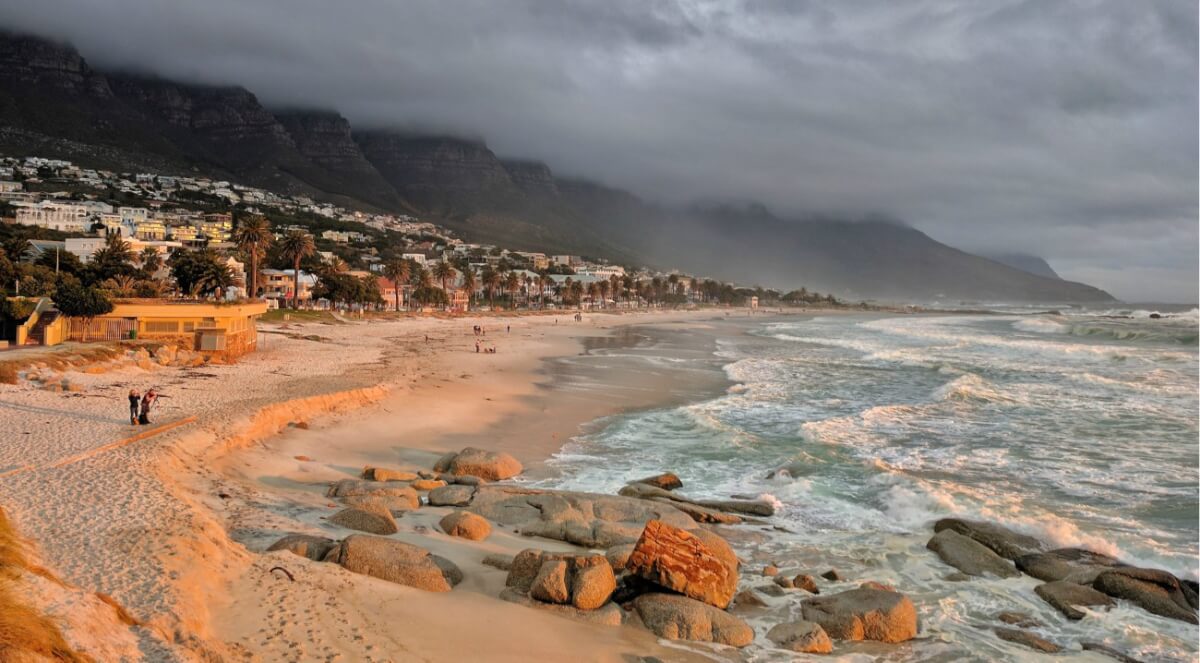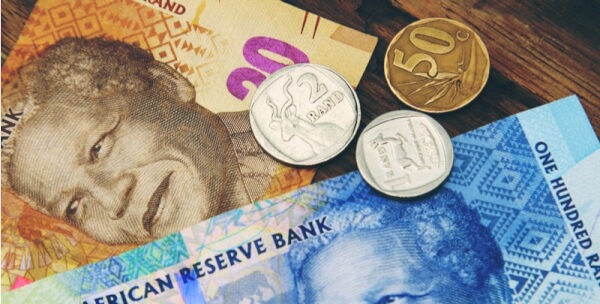Taking cash in or out of South Africa: What are the rules?
How much money can you take to South Africa from the UK? Read this handy guide for info on the rules for taking cash in and out of South Africa.

South Africa is a hugely popular destination for holiday-makers and expats alike. And it’s easy to see why. From vibrant cities to some of the continent’s best safari, fantastic beaches and the world-renowned Winelands, there’s something for everyone.
Whatever brings you to South Africa, you’re going to need some cash. Using ATMs to pay your way, is a convenient choice for many travellers and expats. Here’s all you need to know about using ATMs in South Africa.
South Africa has a developed banking system. There’s no shortage of ATMs to be found in or near bank branches, shopping centres and supermarkets. It’s worth knowing that there have been reports of ATM scams, in which people offer to help others use an ATM, and then rob them. There’s nothing complex about South African ATMs; if someone offers to lend a hand, be wary.
Find the most convenient ATM wherever in South Africa you happen to be, using one of the following ATM locators from large national and regional banks:
Visa and Mastercard are widely accepted in South Africa. Discover cards have ‘moderate’ acceptance rates - meaning some merchants and ATMs will accept them, but not all.¹ Amex can be used for ATM withdrawal at Nedbank operated ATMs.³
Find a handy ATM to suit your needs using one of the following locators:
Bank cards issued in South Africa usually have a 5 digit PIN code, with chip and PIN technology. ATMs can generally accept PIN codes of varying lengths, though, which means that cards with a 4 digit PIN - from Europe, the UK or Australia, for example - are also accepted in South Africa.
American magnetic stripe cards can still usually be used in ATMs in South Africa, but you’ll need to get the card’s PIN from your bank before you travel.
Some travellers report that their bank cards will work in some ATMs, but not others. This could be due to connection issues, for example, so it’s worth trying a second ATM if you struggle to get cash from the first machine you try. Finally, if you have any concerns, use an ATM in a bank branch during working hours - then you can check with staff if you have any problems.
The amount you can withdraw in one day will depend in part on your local bank. If you’ve set a maximum daily cash withdrawal limit with your home bank, it’ll apply in South Africa, too.
If you don’t have your own limits in place, then the ATM providers rules will apply instead. These vary between different banks but are likely to be in the region of R2,000 to R5,000. However, some ATMs from smaller or private providers - like those in convenience stores for example - might have lower limits in place.
The last thing you want during your holiday in South Africa is to discover your bank card has been blocked or limited.
However, if your bank fraud department spots unusual spending patterns - such as a sudden spike of spending overseas - they might block or limit your card for safety until they can confirm it’s you using it.
You can avoid this easily enough, if you tell them you’re planning to travel, ahead of time. That way, you should be able to continue to use your card as normal during your trip.
If your home bank is part of a regional or global group which is represented in South Africa - such as the Global ATM Alliance - you might get free or cheap cash withdrawals if you use ATMs provided by other banks within the group.
Nonetheless, there are a few extra fees - and potential ripoffs - to watch out for if you use your foreign card in an ATM in South Africa.
One thing to look out for whenever you’re using a debit or credit card abroad is dynamic currency conversion (also known as DCC for short). This can crop up in stores, restaurants or at ATMs, any time you’re asked if you want to pay in your home currency instead of rand.
DCC transactions are usually a bad value for customers. The exchange rate used is often not the real, mid-market rate - the one you’d find on google. More often than not, it’s much worse than you might expect because the ATM provider marks the rate up and pockets the difference as their profit. What’s more, because you only ever see the costs expressed in your home currency, it’s not always easy at the time, to work out what rate has been applied. You’ll get a better deal if you always choose to pay in the local currency instead.
There are other charges to worry about, aside from DCC. Often your own bank will also charge you to withdraw cash from an ATM abroad, so it’s a good idea to check out the details in your bank account terms and conditions before you travel.
It’s possible that you’ll also be charged a fee by the South African bank for the use of the ATM. This can be R25 to R50 for regular banks, but some travellers have reported being hit by fees up to about R200 per transaction.⁴ Independent ATMs in particular can have very high fees and should be avoided.
However, if you’re already banking with a global brand or your home bank has a partner institution in South Africa, you might strike lucky and get cheap or fee-free withdrawals if you stick to their ATMs.
Some of the large regional banks operating in South Africa offer free withdrawals to their global customers and customers who bank with their partner institutions abroad.
Barclays Africa, for example, are members of the Global ATM Alliance, which offers cheap or free ATM use for its customers.² If you bank with another member of this alliance - such as Westpac or Bank of America, it’s worth checking out the terms on your account, as you might be able to dodge local ATM fees entirely by sticking to Barclays operated machines.²
Even if you don’t bank with a Global ATM Alliance member, you can reduce ATM fees in South Africa with a few simple tricks.
The first thing to check is whether or not your home bank offers cheap or free ATM use through a local partner institution in South Africa. You might be able to benefit from free or reduced fee cash withdrawals if they do.
If like many people, you have several different bank accounts to choose from, it’s worth checking which offers the best deal for overseas cash withdrawals. Foreign currency cash advances using a credit card, for example, are usually an expensive choice and should be avoided if at all possible.
In some tourist locations, pubs, nightclubs and so on, you’ll find that the ATMs available are privately run ‘in association with’ a bank. These tend to have high fees, and might not offer great value. Stick to ATMs attached to banks, in supermarkets or shopping centres if you can.
Lastly, don’t forget DCC. It’s an entirely avoidable expense - just choose to pay in local currency, at ATMs, in shops and restaurants, to make sure you avoid DCC’s high fees and poor exchange rates.
For a convenient and cheap alternative to get the rand you need for your trip to South Africa, try Wise. There’s no need to worry about hidden fees and unfair exchange rates, as Wise only use the real, mid-market exchange rate for transfers. There’s a transparent fee structure for each transaction, so you know exactly what you’re getting - no surprises.
If you have a local bank account in South Africa, or if someone you know does, you can transfer money between accounts, before your trip. Then withdraw cash from the local account using ATMs, as and when you need it.
For expats and regular travellers, a borderless multi-currency account from Wise could be even better. Accounts don’t have any monthly service fee, and you can hold your cash in any one of dozens of different currencies, including rand. You can even get a debit card for your account and spend using that to avoid ATM fees, and dodgy exchange rates, entirely.
ATM withdrawals are a convenient way to get your cash for your trip to South Africa, without being hit by unfair fees. Or, you could give Wise a try. Send money to a local account, or spend using your borderless multi-currency account card, and avoid ATMs altogether.
Sources:
¹https://www.discover.com/credit-cards/help-center/account/international-use.html (January 29 2018)
²https://www.westpac.com.au/international-travel/access-money-overseas/global-atm-alliance/ (January 29 2018)
³https://www.nedbank.co.za/content/nedbank/desktop/gt/en/personal/bank/credit-cards/american-express-cards.html (January 29 2018)
⁴https://www.capetownmagazine.com/money-south-africa (January 29 2018)
This publication is provided for general information purposes only and is not intended to cover every aspect of the topics with which it deals. It is not intended to amount to advice on which you should rely. You must obtain professional or specialist advice before taking, or refraining from, any action on the basis of the content in this publication. The information in this publication does not constitute legal, tax or other professional advice from TransferWise Limited or its affiliates. Prior results do not guarantee a similar outcome. We make no representations, warranties or guarantees, whether express or implied, that the content in the publication is accurate, complete or up to date.
*Please see terms of use and product availability for your region or visit Wise fees and pricing for the most up to date pricing and fee information.
This publication is provided for general information purposes and does not constitute legal, tax or other professional advice from Wise Payments Limited or its subsidiaries and its affiliates, and it is not intended as a substitute for obtaining advice from a financial advisor or any other professional.
We make no representations, warranties or guarantees, whether expressed or implied, that the content in the publication is accurate, complete or up to date.

How much money can you take to South Africa from the UK? Read this handy guide for info on the rules for taking cash in and out of South Africa.

Should you pay with cash or card in South Africa? A handy guide including cash etiquette, South African ATMs and using your UK card.

Check out our in-depth guide on everything you need to know about buying a prepaid South Africa SIM card, including different providers, pricing, and features.

Travelling to South Africa soon? Don’t let sickness ruin your trip with this guide to all you need to know about travel health and vaccinations for South Africa

Sometimes called the Rainbow Nation because of its diversity of cultures, people all over the world are increasingly noticing South Africa — and for good...